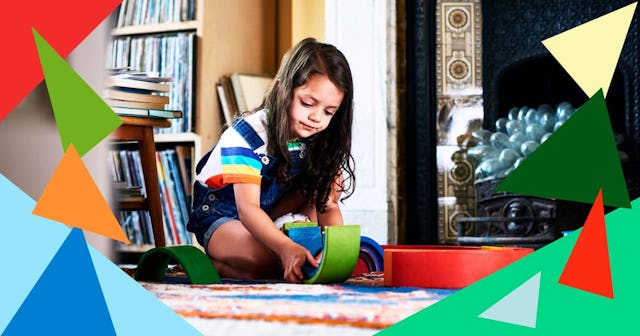Why Ages 2-7 Are So Important For Brain Development

If your five-year-old is anything like mine, he or she has made you question something you thought you knew. For instance, whenever we go someplace, my kids ask me, “Are you going the right way?” They know I get lost often, and they think they’re going to tell me the way to go. They sometimes think they know everything — and while we know they absolutely do not, this age is actually the best time to teach them as much “everything” as we can. Because as the five-year-olds that they are, their brain development matters immensely right now.
There are critical periods in a child’s development which happen in spurts. One begins at the age of 2 and the other starts in adolescence. During these periods, the connections (called synapses) between brain cells (or neurons) double. For example, your two-year-old has twice as many synapses as an adult! That’s why these early years are a prime time for our kids to absorb everything around them, and learn and grown. Between the ages of 2-7, our kids have the ability to learn faster than any other period in life. Our kids’ brain development matters immensely both before and after that span, of course, but it’s especially important in those years between 2-7.
It’s during these critical years that we can help our kids develop a growth mindset: the belief that their abilities can improve over time and with effort, rather then the black-and-white belief that they’re either good at something or they’re not. This kind of mindset can help them for the rest of their lives. To help foster a growth mindset, we can praise the process instead of the result — telling them we appreciate the way they worked to solve the problem or learn the skill, whether the outcome was success or failure. We can let them know that failure isn’t anything to be ashamed of, but something we can learn from that can help us improve.
The social and emotional health of our children, especially during the age we’re living in, is also important. In addition to promoting a strong growth mindset, we must also introduce our kids to a wide range of possibilities no matter their gender or interests. Since kids’ brains are so malleable during these years, allowing them to “sample” all kinds of different experiences with music, art, math, sports, and language will lay a broad foundation that can be narrowed down in later years.
And while we’re all at home these days, it’s a great time to let them discover. My daughters, who just turned five years old, are chemists scooping cups upon cups of flour and mixing it with any liquid they can find while making a complete mess in my kitchen. By night, they are coloring and enjoying quiet time with their books. The pandemic has practically given them free rein of my kitchen and the ability to make a mess any time of day, which ultimately allows me to get shit done — and helps develops their brains, to boot!
MoMo Productions/Getty
RELATED: The Best Kids Microscopes For Bringing The Science Lab Experience Home
When my girls turned five, along with their gifts, they received a calendar of daily chores and a mason jar with their names on it. They also received a little bit of a lecture about the importance of chores and the importance of saving money. For each day they complete their chore, they receive a quarter to put into their save jars. This is also important for their brain development, as they are learning to be helpful to their family members and that everyone has a role to play in our home. When their chores are not finished, we talk about what happened and how their actions may have hurt our family in some way, like forgetting to give everyone a fork at dinner as they set the table. Ages 2-7 are a prime time to develop emotional intelligence, and chores (and talking about them) help them hone those important interpersonal skills like teamwork and empathy.
In her newsletter Confident Parents, Confident Kids, social and emotional learning expert Jennifer Miller shares plenty of tips and tools to strengthen our kids’ social and emotional health during this all-important stage of brain development. Whether it’s at the dinner table, or in the car driving to the grocery store, or in the grocery store itself, every bit of what we are teaching our kids gives them the opportunity to grow as little beings.
Recently, my daughter asked me to sign her up for Chinese lessons so she can speak to her bestie in Mandarin. Who am I to hold this little girl back from learning Chinese? So, I’ll look for a Chinese tutor — but not because I want to dole out money to simply make my kid happy (though that’s definitely part of it). I want to foster her love for learning, her desire to want to speak with her friend in her native language. And I want to show my daughter that she can try anything (within reason) … right now, while her brain is the most receptive it will ever be.
This article was originally published on